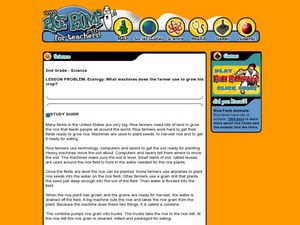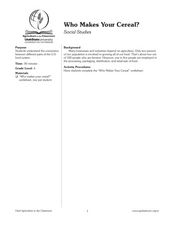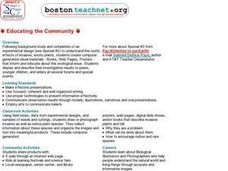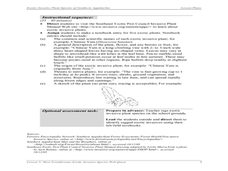Curated OER
Sunny Sunflowers
First graders, after assessing how plants grow in relation to light, create models of sunflowers within a game to help them remember their science lesson. In addition, their visual models serve as a demonstration of photo tropism in...
Curated OER
Beans and Birds: A Natural Selection Simulation
Students solve the following problem concerning the evolution of seed color in pinto bean plants: "How does natural selection change the frequency of genes or traits over many generations?" They use the constructivist approach to...
Curated OER
A Field of Beans
Beans, or legumes as they are sometimes called, are the topic for an integrated multi-subject lesson. Youngsters will read, write, observe, and research everything there is to know about beans. They read a bean story, conduct a bean...
Curated OER
Where Does Food Come From?
Students recognize that food we eat comes from farms. In this where does food come from lesson, students discuss planting crops and how they grow. Students plant seeds for edible crops and eat them when are ripe. Students...
Curated OER
Machines Rice Farmers Use
Second graders investigate rice farming. In this farming equipment lesson, 2nd graders discover what type of equipment is needed to get rice farms ready to plant. Students gain knowledge about what a combine does and how it is important...
Curated OER
Stella the Swan
Students analyze the telling of a story with props. They study similarities and differences between ducks, geese and swans, how wildfowl are adapted to life in water, how wildfowl move and feed, and wildfowl family life, how they nest,...
Curated OER
Wiggley Worms
Students investigate how worms affect plant growth. In this biology lesson, students construct a worm ecosystem in a plastic 2 liter bottle and plant a seed in the soil. They later compare the ecosystems with worms to ones...
Curated OER
How Does Your Garden Grow?
Young scholars examine birdseed to see if it is a fertilized seed. In this birdseed garden lesson, students experiment with birdseed on a sponge to see what grows. Young scholars record the growth of seeds.
Curated OER
Rice Farming in Texas
Third graders explore how rice farming came to Texas. In this rice farming lesson, 3rd graders discover the history of how farmers began to grow rice in the United States. Students color code maps and create a timeline for rice farming...
Curated OER
6: Parts of a Flower
Young scholars draw and label the parts of a flower using a coin from the Northern Mariana Islands. In this flower parts instructional activity, students look at a transparency of the reverse side of a quarter from the Mariana lslands....
Curated OER
Who Makes Your Cereal?
Fourth graders investigate how cereal is produced. In this agricultural lesson plan, 4th graders discuss where ingredients in cereal come from. Students use picture cards to identify the steps in producing cereal.
Curated OER
Photosynthesis: An enlightening experience
Students observe the effect of light on plants. They illustrate the exchange of gases between the atmosphere and the plant. Students see that plants are part of many natural cycles. They investigate how green plants use the sun's energy...
Curated OER
Flower Power
Students investigate and explain the basic needs and life processes of plants. Key concepts include: living things change as they grow and need food, water, and air to survive. The reverse of the Kansas quarter serves as inspiration.
Curated OER
Educating the Community
Students research the effects of invasive and exotic plants. They create posters, webpages and books to educate the community. They present their material in different forums.
Curated OER
From Flower to Fruit
Students examine how flowers have essentially four parts. They learn both the male and female reproductive parts of the flower, then explore self-pollination and pollination by insects and other animals.
Cold Spring Harbor Laboratory
Genes Don't Blend
Yellow and blue make green—unless you're studying the inheritance of genetic traits. An interactive lesson explains the difference between blended traits and pure traits and gives examples of their occurrence. The resource includes a...
Curated OER
Most Troublesome Exotic Invasive Plant Species Web Quest
Students participate in a Web Quest activity in which they identify common exotic invasive plant species of the Southern Appalachian Region. After identifying the top 10 exotic invasive species, they choose one to research in depth.
Curated OER
A Garden in the Mailbox
Students study seed catalogs to find information about plants and growing seasons. They write letters requesting a seed catalog after using online resources. They use them complete an associated worksheet and discuss zone maps for their...
Curated OER
Plant Growth & Development
Young scholars share what they know about plants and discuss what else they would like to know. The teacher evaluates students' prior knowledge of plants to inform future instruction. Young scholars practice observation and prediction...
Curated OER
Archaeobotany
Pupils study pictures of seeds and the conditions in which they grow during their study of archaeobotany. They infer ancient plant use by looking at archaeobotanical samples. They determine the change of plant use by interpreting a graph...
Curated OER
Finding and Collecting in the Field
Learners examine the types of plants brought over to America from immigrants. They research how some of these types of plants cause damage and alter the landscape. They record data and share the information with the community.
Curated OER
Dune Plan Adaptations
Students tour Coal Oil Point Reserve. They locate the species of plants that are on the handouts ,and describe the different adaptations used by plants in their specific area of the dunes.
Curated OER
Salinity Of Soil
Fourth graders investigate the contents of various types of soil to determine the differences in salinity levels. They conduct an experiment of observing the plants in the different soils. Students then determine survival rates by...
Curated OER
Let it Grow, Let it Grow, Let it Grow
Students investigate, through a hands-on activity, in which type of soil a bean seed grows best. They create a bar graph representing each plant's growth in different soils.























